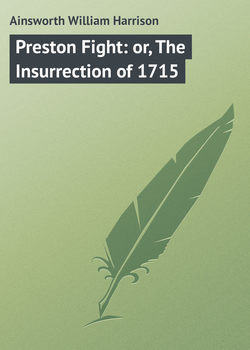Читать книгу Preston Fight: or, The Insurrection of 1715 - Ainsworth William Harrison - Страница 9
BOOK THE FIRST – THE EARL OF DERWENTWATER
VIII. – COLONEL OXBURGH AND HIS COMPANIONS
ОглавлениеM eanwhile, another arrival had taken place at the castle.
A party of horsemen, all well mounted, and well armed, rode into the court-yard, and claimed the earl’s hospitality, which could not be refused.
The party consisted of half a dozen Roman Catholic gentlemen – staunch Jacobites – who had banded together, and were in the habit of riding about the country to see how matters stood – sometimes stopping at one house, sometimes at another – and always heartily welcome, wherever they went.
The leader of the party was Colonel Oxburgh, who had fought and distinguished himself under James the Second. His companions were Captain Nicholas Wogan, Charles Wogan, and three other Jacobite gentlemen, named Talbot, Clifton, and Beaumont. They had pistols in their holsters, and swords at the side, and presented a very formidable appearance, as they rode together.
Colonel Oxburgh was an elderly man, but in possession of all his energies, and expected a command, if a rising should take place in favour of James the Third. He was tall and well-built, and though equipped in a plain riding-suit, had an unmistakable military air.
His companions were very much younger, and all of them looked like gentlemen – as indeed they were – the most noticeable being the two Wogans. Both of these young men were very good-looking, and graceful in figure. Captain Wogan had a very interesting countenance. As they had no servants with them, each carried a small valise attached to his saddle.
Colonel Oxburgh was an old friend of Sir John Webb – indeed, they had served together in Ireland – and, wishing to see him before he left the North, he was proceeding to Bamborough Castle with that object, when he learnt that Sir John and his family had just taken their departure, but meant to halt at Dilston. Thereupon, the colonel changed his course, and went to the latter place.
On his arrival, his first inquiries were whether Sir John was there, and, being quickly satisfied on this point by Newbiggin, he dismounted, and his companions followed his example. The horses were taken to the stables, and the bags ordered to be brought into the house, as if it had been an inn, and while this was being done, the colonel again addressed Newbiggin, and asked if there was any other company at the castle.
The butler smiled significantly.
“We have a very important person indeed here, colonel,” he said. “I need keep no secret from you and your friends, because you are all loyal. What will you say, gentlemen,” addressing the whole party, “when I tell you that the Chevalier de Saint George is here?”
“I should say the statement is scarcely likely to be correct, my good friend,” rejoined the colonel, dryly. “You are jesting with us.”
“‘Tis true, I assure you, colonel,” said Newbiggin. “His majesty is at Dilston at this moment. You will soon be convinced of the fact.”
“I am convinced now,” cried Colonel Oxburgh. “But you cannot wonder at my incredulity, and you see it was shared by all my friends. Since such is the case, gentlemen,” he added, turning to the others, “we must remain where we are for a few minutes. We must not present ourselves to the king till we learn that it is his majesty’s pleasure to receive us.”
“I have no doubt upon the point, colonel,” said the butler; “and I will venture to take you to his majesty at once, if you will allow me.”
The punctilious colonel, however, could not be moved from his position, nor would he enter the house, so New-biggin was obliged to leave him and his friends in order to make the necessary announcement.
Ere long, Lord Derwentwater appeared, and welcomed them with the utmost cordiality, stating at the same time that his majesty would be delighted to receive them.
His lordship then conducted them to the garden, and presented them to the prince, who accorded them a most gratifying reception, shaking hands with Colonel Oxburgh, and treating him like an old friend.
“I have often heard the king, my father, speak of you, colonel,” he said; “and always with regard. He was deeply sensible of your attachment to him.”
“The attachment I ever felt towards his majesty is now transferred to his son,” replied the colonel, laying his hand upon his heart. “I only hope the time has come when I can prove my loyalty and devotion.”
“We will talk of that anon, my dear colonel,” replied the prince.
And he then addressed himself to the others, to each of whom he had something agreeable to say. His highness seemed particularly pleased with Captain Wogan.
While this was going on, Colonel Oxburgh exchanged a greeting with Sir John Webb and Forster, nor did he omit to pay his devoirs to Lady Webb and the younger ladies.
